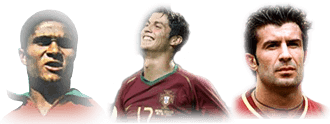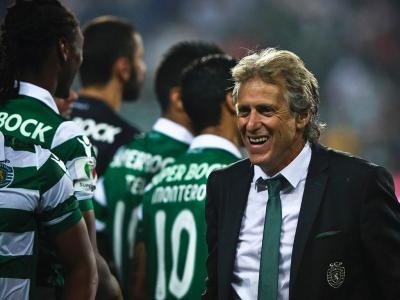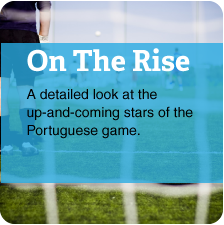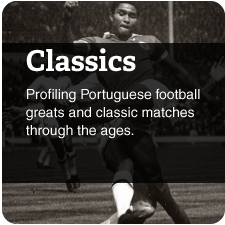The group stage of the 2015/16 Europa League kicks off tomorrow with three Liga NOS representatives flying the flag for Portugal.
Sporting coach Jorge Jesus, having led Benfica to the final in 2 of the last 3 seasons, has made it clear he wants to take Sporting one step further.
PortuGOAL, with the aid of experts from around the football blogosphere, brings you a detailed look at all four teams comprising Group H.
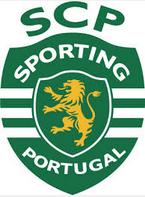 Sporting Clube de Portugal:
Sporting Clube de Portugal:
By Tom Kundert
These are exciting times for Sporting. After years in the doldrums, the club has been making good progress on and off the pitch since the election of club president Bruno de Carvalho in March 2013. The sensational appointment of Coach Jorge Jesus from cross-city rivals Benfica has further fuelled hopes that the Lisbon club can compete with Benfica and FC Porto domestically and make a splash in Europe.
The attack-minded Jesus has immediately made his mark, bringing a vibrancy and zest to Sporting’s play. The club have made a positive start to 2015/16, winning the Super Cup against Benfica and sitting joint top of the table after four games, alongside Porto. The only blemish preventing it from being a perfect start was the failure to make the Champions League group stage, the Lions unluckily falling to CSKA Moscow in a close-fought tie.
Hopes are high that Sporting can go far in the Europa League, a competition that Jorge Jesus has enjoyed success in, leading Benfica to two successive finals in 2013 and 2014.
Sporting’s major strength is its dynamic attacking play, with multiple goal threats making the Portuguese side a real danger to any opposition. The creativity of midfielders João Mário and Bryan Ruiz and especially the extravagantly talented winger André Carrillo guarantee a good supply line to the strong strike partnership of Islam Slimani and Téo Gutiérrez.
The team is served well between the posts with Portugal goalkeeper Rui Patrício earning the nickname “Saint Patrício” among Sporting fans because of his many heroics over the years.
The team’s relentless forward momentum (Jorge Jesus’ 4-4-2 frequently morphs into a 4-2-4) makes them easy on the eye, but comes at a price with the defence looking fragile. Sporting have kept only one clean sheet in their first seven matches this season. Right-back João Pereira can be considered a weak link, and the fact both full-backs are encouraged to bomb forward leaves the side vulnerable to fast counter-attacks.
He hasn’t kicked a ball yet this season owing to injury, but if Sporting are to be successful in 2015/16 holding midfielder William Carvalho will surely play a pivotal role.
As explained above, Sporting’s all-out attacking style can leave them exposed and lacking numbers in their defensive third. William’s powerful tackling, astute positioning and excellent distribution will undoubtedly mask this weakness. During Jorge Jesus’s Benfica years the holding midfielder was invariably the team’s most important player and this is likely to be the case at Sporting too.
I cannot honestly say I know much about Sporting’s Group H opponents in the Europa League, which makes it difficult to predict.
A key factor may be how the club approach their European commitments given that the overriding goal is to win the Portuguese championship for the first time since 2001/2002.
But based on what the team has produced so far this season, its largely successful campaigns in this competition over the past decade and the impressive Europa League record of Coach Jorge Jesus, I expect Sporting to progress from the group, albeit with one or two hiccups along the way.
 Lokomotiv Moscow:
Lokomotiv Moscow:
By Ilya Sokolov (@Lokosokol) of Russianfootballnews.com
Lokomotiv have started the season great, as they are currently placed second after city rivals CSKA. After a depressing year under Miodrag Bozovic, it has been a pleasure to watch Lokomotiv this season, where they are currently the second highest scoring team in the Russian league, after Zenit. It is however worth noticing that Lokomotiv have had an easy schedule and are yet to face Zenit, Spartak and CSKA.
Lokomotiv’s greatest strength so far this season has been their left wing. According to Whoscored’s rating, Lokomotiv’s left back Vitaly Denisov (7.73) has performed the best for the team this season, while left midfielder Alan Kasaev (7.65) comes second, as he has contributed with 3 goals and 2 assists so far. The strong left side is something Lokomotiv take advantage of, as 40% of their attacks goes through here.
Denisov joined the club in 2013 as a replacement for Andrey Eshchenko, and he quickly established himself as one of the best full-backs in the league. Denisov usually plays high up the field, which allows him to participate in offensive play, but he always returns to the defense faster than his opponent. He is a strong crosser, and he is on top of that also capable of making long and dangerous throw-ins into the penalty area.
Kasaev is the most unpredictable and creative player in the squad. By “unpredictable” I mean both his actions and his form. Kasaev at his best is very hard to play against. He usually chooses between three options: crossing, shooting or dribbling past defenders, and nobody knows what he is going to do in the next second. He is in many ways similar to Andrey Arshavin in both good and bad ways. Kasaev is a very inconsistent player, so some teams will be lucky to play against a shadow version of him.
Lokomotiv are in general dangerous as a counter-attacking team. This season Lokomotiv have won all four of their away games, and that is no coincidence. Lokomotiv prefer to press high up the pitch, and when they intercept the ball it is quickly moved forward. Lokomotiv have become very effective in taking advantage of the space behind the defenders of offensive teams.
While the Railroader’s left side is strong, the right side tends to slow down the game and negate the efforts on building counter attacks, something that both the right back Roman Shishkin and the winger Aleksandr Samedov unfortunately do. Shishkin is furthermore poor defensively. Both are good crossers, but as long as the natural target man Petar Skuletic doesn’t play, this quality isn’t needed very often. Lokomotiv rarely attacks through the right wing, so there is no need to worry about any actions happening there.
While Lokomotiv are strong against offensive minded teams, who aim to dominate the games, they are poor against weaker opponents who park the bus. The main striker Oumar Niasse is not very good in build-up play, and head coach Cherevchenko doesn’t seem to trust Skuletic, who is stronger on the ball than Niasse.
While Lokomotiv may have brighter players than the central defender, former Tottenham player, Vedran Corluka is a key player for the Railroaders. With him on the field Lokomotiv can defend against anyone, and he always keeps their defence solid. Corluka is a good ball playing defender, which means the opposing teams need to prevent him from splitting long through balls. Ever since he arrived in Moscow Corluka has been one of the leaders of the team, which explains why Cherevchenko made him the captain before this season started.
While Sporting look like the group’s team to beat, the two teams the current West Ham United manager Slaven Bilic have trained should compete for second place. Skenderbeu are not as weak as many in Russia think, and Lokomotiv may struggle against them. I see the Russian team fighting for second place, but a lot depends on Cherevchenko’s ability to rotate the squad and keep the players fresh and well rested.
 Besiktas:
Besiktas:
By Kaan Bayazit (@Razzerian) of Besiktas-international.com
The biggest change compared to last season is without a doubt Şenol Güneş replacing Slaven Bilic as head coach. Where Bilic was a coach who looked at the defensive organization of his team first and foremost, Güneş is someone who is out to play attractive attacking football. And so far this season there has been an obvious “Güneş effect” as Beşiktaş have scored 12 goals in only four Süper Lig games, which has been enough for a current second place. They lost top scorer Demba Ba before this season, but replaced him with another top class striker in Mario Gómez. Long time captain Tomas Sivok has also departed the club and has been replaced by former Grémio captain Luiz Rhodolfo, while Hoffenheim captain Andreas Beck was brought in to strengthen the right back position. Prodigal son Ricardo Quaresma, who is facing his former club Sporting CP, made his return to the club after joining them from FC Porto.
The major strength of the team at this point is their attacking approach where players like Oguzhan Özyakup, Gökhan Töre and Ricardo Quaresma contribute to the games with a creative spark. With Mario Gómez and Cenk Tosun they have two quality forwards able to finish the attacks set up by the creative brains of the team. Beşiktaş have also been very strong on the road these past two seasons and that trend so far has continued under Şenol Güneş.
Besiktas’ biggest weakness is without a doubt that they aren’t able to play their home games in their own stadium. Beşiktaş are famous around the world for having some of the most fanatical fans. However, the stadium was demolished back in July 2013, and the construction of the new Vodafone Arena is still not finished. The stadium was expected to be finished around the start of October but after an accident with the roof works last month the construction will take at least 3 months longer. Besiktas will instead play their home games at the Atatürk Olimpiyat stadium, a stadium where they have had little success so far. The stadium is very big and open, which causes a lot of wind issues. Furthermore a lot of the noise from the crowd disappears because of the athletics track around the pitch.
Besiktas’ key players are Gökhan Töre, Oguzhan Özyakup and Ricardo Quaresmo. Töre is a creative player who can open up any defence with his strong dribbling and perfectly timed crosses. Özyakup had a disappointing last season under Bilic, but he is one of the club’s brightest young talents, and he has made one goal and three assists already this season. Even though Quaresma’s return to Besiktas has been a bit anti-climactic as he managed to score a fabulous goal against Trabzonspor only to get sent off five minutes later. He does however have the ability to change a game out of nowhere, so he is one to watch.
Beşiktaş have the quality to compete for the top spot in this group, but it won’t be easy as the three favourites seem closely matched. For Beşiktaş much will depend on the home games. If they can beat Lokomotiv and Sporting at home, they have a good chance of topping the group, but the Atatürk Olimpiyat has been a thorn in the club’s eyes for two years now and it may end up costing them in this competitive group.
 Skënderbeu:
Skënderbeu:
By Kosovare Mezini (@KosovareMezini) of Albanianeaglefootball.com
You only need one word to describe Skënderbeu Korçë’s entrance in the Europa League’s group stage – historical. For the first time ever an Albanian team is participating in the group stage of an UEFA tournament. The team from the city of Korçë, in the South-Eastern part of Albania, failed to enter the Champions League group stage after losing to Dinamo Zagreb in the last round of the qualification, and the defeat meant that they had to settle for the Europa League instead. Skënderbeu’s qualification has forced writers and announcers all over the world to learn how to pronounce not only the team’s name but also the names of the players.
Skënderbeu almost made it to the EL group stage in the 2013/2014 season, but back then they were beaten by Ukrainian side Chornomorets after a penalty shoot-out.
Hoping to write history again the six time Superliga winners from Skënderbeu were actually the first team to settle in the history book of Albanian football. After a league title drought of no less than 78 years, the club has won every single championship since the 2010/2011 season. The club is now adding aa new chapter to the history book, and it should inspire the players to fight the best they can, but the squad is unfortunately not very experienced. Despite Skënderbeu’s annual summer training camp in Austria, where they face international competition, nothing can really prepare Mirel Josa’s boys for the real deal.
Historical is the word, but who are the players who helped the club achieve, what they did? Well, Captain Bledi Skëmbei led his team to a Superliga win last season, even though the Croat striker Pero Pejić left the club to join Kukësi, where he went to score 31 goals. The 37-year-old goalkeeper Orges Shehi, second choice on the Albanian national team, was brilliant, as he only conceded 18 goals, which was the lowest in the league. With the departure of Pejić, the goal scoring was spread out among the players, so this summer Skënderbeu brought in power house Hamdi Salihi from Israel, and it sure was the right move. Salihi found the net five times during CL qualification and on top of this Bernard Berisha scored twice, which made Belgian giants Anderlecht scout him. This duo, together with Liridon Latifi, has proved to be a dangerous attacking force. So far this season they’re already on top of the table with nine points after three rounds played and they are yet to concede a goal.
The group stage will not be easy for Skënderbeu, as they are lined up against experienced teams. While Lokomotiv, Sporting and Besiktas all are familiar names for the typical sport nerd, very few have heard of Skënderbeu from Albania, which means they can use their underdog status to their advantage. Even though Skënderbeu are the strongest club in Albania, they need more international experience, which means they’ll struggle a lot. I am not so sure about Skënderbeu’s success although I am hoping that they’ll prove us all wrong.
Our thanks to Ilya Sokolov, Kaan Bayazit, Kosovare Mezini for sharing their expertise.
Related: Europa League Preview - away-day trips for Braga and Belenenses

